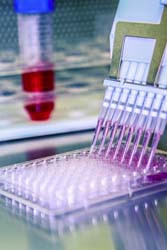Understanding rare kidney diseases
Rare kidney diseases are a group of disorders of unknown genetic or molecular aetiology and are characterised by significant phenotypic variability. Although they have a dismal impact on life expectancy and quality of life, diagnostic and therapeutic management options are highly unsatisfactory. Currently there are no molecular markers or models to allow for efficient prediction of disease risk. High-throughput studies are possible for rare kidney diseases using kidney biopsies. Subsequent transcriptomic, proteomic and morphological analyses should provide invaluable insight into the pathogenesis of these rare disorders. In addition, urine and amniotic fluid constitute excellent molecular readouts that could give an indication of renal malfunction. The EU-funded EURENOMICS (European consortium for high-throughput research in rare kidney diseases) project is utilising high-throughput technologies to perform a large scale analysis of patient samples. The consortium has access to a large cohort of over 15 000 patients and biorepositories of DNA, serum, amniotic fluid and kidney biopsy specimens. The activities of the project include the search for new genes that cause, modify or predispose individuals to disease phenotypes. So far novel disease-causing mutations and genomic rearrangements have been detected, while exome sequencing has identified new genes implicated in these disorders. Numerous additional candidate disease genes are currently undergoing functional characterisation. The consortium is also performing multi-level molecular profiling (mRNA, miRNA, proteome, metabolome) of body fluids and renal tissues to identify unique molecular disease signatures. They are searching for novel antigens and antibodies, and have made significant progress with respect to the molecular mechanisms of auto-immune disease. Fundamental new insights into disease penetrance indicated that in NPHS2 glomerulopathy, phenotype is directly dependent on the nature of the combining mutations. This discovery is the first description of mutation-dependent recessive inheritance in human genetics. From a therapeutic perspective, scientists have developed in vitro and in vivo models for screening compound libraries for novel therapeutic agents. Combined with other technologies they envisage diagnostic progress, risk prediction as well as strategies for disease management.
Keywords
Rare kidney diseases, phenotype, diagnosis, biopsy, molecular profiling

